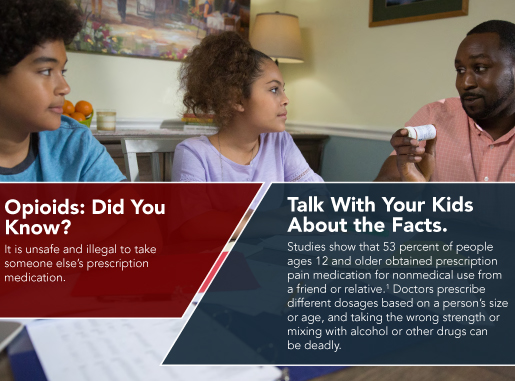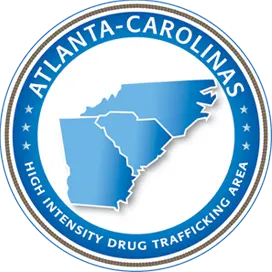A guide from the Substance Abuse and Mental Health Services Administration | SAMHSA.gov
Start talking with your kids about the facts about the dangers of alcohol and other drugs. SAMHSA’s substance use prevention campaign gives parents and caregivers tips and tools to start talking to their children early.


Parent Drug Guides
Guides from the Partnership to End Addiction | DrugFree.org
Not sure how to prevent drug or alcohol use? Or what to do if you suspect or have discovered substance use? The Partnership to End Addiction has the science- and research-backed information to help you help your child.
A comprehensive and up-to-date source for everything you need to know to better prevent the use or misuse of the substances most accessible to teens and young adults.
Statewide Resources
• More Powerful NC Campaign – The MorePowerful NC campaign was developed by the NC Attorney General Josh Stein and NCDHHS Secretary Mandy Cohen to raise awareness around the impact of the opioid epidemic in North Carolina.
• 988 Suicide and Crisis Line: Dial 988 – The 988 Suicide & Crisis Lifeline is a national network of local crisis centers that provides free and confidential emotional support to people in suicidal crisis or emotional distress 24 hours a day, 7 days a week in the United States.
• The Alcohol/Drug Council of North Carolina – Crisis Line: 800-688-4232 – The ADCNC is a non-profit organization that provides information and referrals to alcohol and drug treatment. Watch this video to better understand substance use disorder treatment options in North Carolina.
• The Hope4NC Helpline – (855)-587-3463 – The Hope4NC Helpline connects North Carolinians to additional mental health and resilience support that help them cope during COVID-19.
• Local Management Entity / Managed Care Organization (LME/MCO) – Locate the LME/MCO for your county, including your 24/7 access-to-care line.
• NC 2-1-1 – Phone: 211 – NC 2-1-1 is an information and referral service that provides free and confidential information on health and human services and resources within North Carolina.
• Crisis Solutions NC – Crisis Solutions NC can help individuals and their families in a crisis find help within their local communities.
• Substance Abuse and Mental Health Services Administration – SAMHSA’s Behavioral Health Treatment Services Locator helps individuals find treatment facilities anonymously.
• Federal Treatment Finder – SAMHSA collects information on thousands of state-licensed providers who specialize in treating substance use disorders, addiction, and mental illness.
• North Carolina Professionals Health Program – North Carolina Professionals Health Program encourages the well-being and recovery of medical professionals through compassion, support, accountability, and advocacy. NCPHP’s experienced team assists health care providers with substance use disorders, mental health issues, and other issues that may affect their ability to deliver optimal care and services to their patients.
• North Carolina Lawyer Assistance Program – The North Carolina Lawyer Assistance Program is a service of the North Carolina State Bar that provides free, confidential assistance to lawyers, judges, and law students in addressing substance abuse, mental health issues, and other stressors that impair or may impair a lawyer’s ability to practice law effectively.
• BarCARES – BarCARES is a confidential, short-term intervention program provided cost-free to members of participating judicial district bars, voluntary bar associations and law schools.
• Find an Opioid Treatment Program in North Carolina – Opioid Treatment Programs provide access to medications used to treat opioid use disorder, including methadone, buprenorphine, and naltrexone, along with counseling and other behavioral supports.
• North Carolina Drug User Health Resource Guide By Region – This drug resource guide provides a list of health departments, treatment locations, and health care providers by region.
• 1-888-688-4222 – Opioid Assistance and Referral Line – Local medical experts offer patients, providers, and family members opioid information, resources and referral 24/7. Translation services available.
• 1-800-662-HELP (4357) – SAMHSA’s National Helpline – Free, confidential treatment referral and information service available 24/7 (in English and Spanish).
• FindTreatment.gov – Find treatment resources available in your area.
Youth Resources
• Text HELLO to 741741 to text anonymously with a trained crisis counselor for free, 24/7 – Suicide Prevention Lifeline – Available 24/7 – 1-800-273-8255 – Helps individuals in suicidal crisis with support.
• Trevor Project Lifeline – Available 24/7 – 1-866-488-7386 – Confidential suicide hotline for LGBT youth.
• Teens Helping Teens – Available 6p to 9p PST – 1-800-TLC-TEEN – Text TEEN to 839863 to speak with another teen.
Dead on Arrival
The Dead On Arrival short movie has powerful first-person accounts of fentanyl deaths told by parents who have lost their children. Dead On Arrival also looks at the impact on of this epidemic on communities and it looks at the manufacture, counterfeiting, marketing, and distribution process that allows fentanyl to find its way into anyone’s home.
Adult version 21 minutes – dead on arrival (fentanyl documentary) – YouTube
Want to watch an age-appropriate version with your child? Dead on Arrival has some dramatic images and mature concepts. Please be sure to watch it with your child and have a discussion after about what they learned.
Natural High – Fentanyl PSA Film (6-Minute Life-Saving Video) – YouTube
Questions to ask your child after viewing.
- What did you learn about fentanyl?
- What would you say to a friend of yours who is planning on trying a pill they get through social media?
- What would you say to a friend of yours who offers you a substance they swear is safe?
- What do you hope to remember from watching this film?
Ad Council – Drop the F bomb with your kids
Drop the F*bomb | Spread the Word (dropthefbomb.com)
Drop the F*bomb | Fentanyl 101 (dropthefbomb.com)
”As a parent, you are the biggest influence in your child’s life and having open, honest conversations is one of the most powerful ways to connect with your kids and help them develop into healthy adults.
- PARTNERSHIP TO END ADDICTION
Save A Life
Naloxone is a opioid overdose reversal drug and it’s saving thousands of lives in North Carolina. Find out where you can get naloxone today.
Find Help
Treatment works and there is hope. Medication along with behavioral therapies have been shown to be effective in treating those with an addiction to fentanyl and other opioids.
Concerned About Someone’s Opioid Use?
If you’re concerned about someone’s opioid or fentanyl use visit the Find Treatment website for information about treatment and counseling options.

